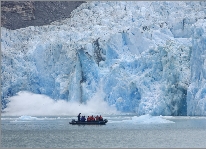1 TRY OUT LANGUAGE
2 LEARN GRAMMAR
3 APPLY ON YOUR OWN
Use Verbs in the Present Perfect Tense
• If you know when an action happened in the past, use a past tense verb.
EXAMPLE Last month, scientists attended a global warming conference. • If you’re not sure exactly when a past action happened, use a verb in the present perfect tense.
EXAMPLE They have attended many conferences. • You can also use the present perfect tense to show that an action started in the past and may still be going on.
EXAMPLES Scientists have studied the temperature of ocean water for a long time. (And they are probably still studying it.) The temperature has increased over time. (And it is probably still increasing.) • To form the present perfect, use the helping verb have or has plus the past participle of the main verb. For regular verbs, the past participle ends in -ed.
| Verb | Past Tense | Past Participle |
|---|---|---|
| melt | melted | melted |
| increase | increased | increased |
| study | studied | studied |
Practice Together
Say each sentence. Choose the correct form of the verb.
1. Melting glaciers (added/have added) more water into Earth’s oceans over the years.
2. Last year, this glacier (melted/has melted) a lot.
3. During my vacation, we (traveled/have traveled) far by ship to study the glacier.
Try It!
Choose the correct verb to complete each sentence. Read the new sentence aloud.
4. I (wanted/have wanted) to take a trip like this for a long time.
5. Yesterday, I (watched/have watched) some ice fall.
6. My friend (tried/has tried) very hard today to take pictures of it, and she is still trying.

We have watched the ice fall for several hours.